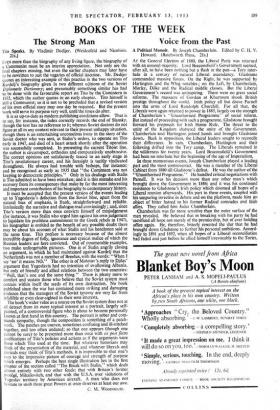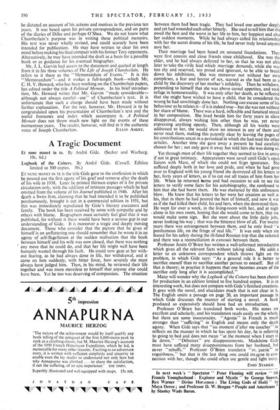EvEN more than the biography of any living figure, the
biography of AT the General Election of 1880, the Liberal Party was returned a Communist must be an interim appreciation. Not only are the with an assured majority. Lord Beaconsfield 's Government seemed, final chapters missing, but even the earlier chapters may later have after all, to have been nothing but a flash in the pan—a Tory inter- to be rewritten to suit the vagaries of official doctrine. Mr. Dedijer hide in a century of natural Liberal ascendancy. Gladstone quotes an interesting example of this practice in the two versions of commanded massive forces. On the Right, he was supported by Kardelj's biography given in two different editions of the Soviet Hartington and the Whig notables ; on the Left, by Chamberlain, Diplomatic Dictionary; and presumably something similar has had Morley, Dilke and the Radical middle, classes. But the Liberal to be done with the favourable report.on Tito by the Comintern in Government's record was uninspiring. There were no great social 1935, which the author quotes in an early chapter. Tito himself is reforms. The massacre of Gordon at Khartoum shook British still a Communist; so it is not to be precluded that a revised version prestige "throughout the world. Irish policy all but drove Parnell of his own official story may one day be required. But the present into the arms of Lord Randolph Churchill. For all that, the work will serve its purpose very well, until the times do alter. Liberals were again returned to power in 1885, largely on the strength It is as up-to-date as modern publishing conditions allow. That is of Chamberlain's "Unauthorised Programme" of social reform. to say, for instance, the index correctly records the end of Slansky, But instead of proceeding with such a programme, Gladstone brought though the text has no reference to it; whereas Soviet doctors do not forward his proposals for Irish Home Rule. The threat to the figure at all in any context relevant to their present unhappy situation, unity of the Kingdom shattered the unity of the Government. though there is an entertaining unconscious irony in the story of the Chamberlain find Harlington joined ,hands and brought Gladstone Soviet doctor who was sent, at Stalin's orders, to operate on Tito- down.- Back in opposition, the Liberal leaders sought to reconcile early in 1947, and died of a heart attack shortly after the operation their differences. In vain. Chamberlain, Hartington and their was successfully completed. In presenting the current Titoist line, following drifted into the Tory camp. The Liberals remained in the author is circumspect, orthodox and comparatively unobtrusive, the wilderness for twenty years. Lord Beaconsfield's Government The correct opinions are satisfactorily traced to an early stage in had been no interlude but the beginning of the age of Imperialism. Tito's revolutionary career, and his foresight is tacitly vindicated In these momentous events, Joseph Chamberlain played a leading throughout. He always had trouble with bishops, for instance; - part and the most controversial. He was a member of the Liberal and he recognised as early as 1935 that "the Comintern was not Cabinet from 1880 till Gladstone's defeat. He was the author of the keeping to democratic principles." Only in his dealings with Stalin "Unauthorised Programme." He handled critical negotiations with is Tito admitted to have been mistaken; and it is this mistake and his Parnell. It was his decision more than any other man's which recovery from its consequences that make by far the most interesting brought down the Government in 1886; and it was his continued and important contribution of his biography to contemporary history. resistance to Gladstone's Irish policy which doomed all hopes of a It must be accepted that the present version of the events leading Laberal reunion afterwards. His part in these events, coupled with up to Yugoslavia's defection from the Soviet bloc, apart from the his unsparing invective in debate and on the platform, made him art natural bias of emphasis, is frank, straightforivard and reliable, object of bitter hatred to his former Radical comrades and Irish Intrinsically the narrative and dialogue read convincingly ; and, since allies. They called him Judas Chamberlain. he dictated an account of his actions and motives in the previous ten years. It was based upon his private correspondence, and on parts of the diaries of DiIke and perhaps O'Shea. We do not know what Chamberlain's purpose was in writing these political memoirs. His text was never wholly revised, and could scarcely have been intended for publication. He may have written to clear his own mind before making his final compact with his former Tory opponents. Alternatively, he may have intended the draft as a basis for a possible book or as guidance for his eventual biographer. Mr. J. L. Garvin had access to the document and quoted at length from it in his three volumes of The Life of Joseph Chamberlain. He refers to it there as the "Memorandum of Events." It is this "Memorandum"—and it makes a full-length book—which Mr. C. H. V. Howard, who has been working on the Chamberlain papers, has edited under the title A Political Memoir. In his brief introduc- tion, Mr. Howard writes that Mr. Garvin "made considerable— although not always careful—use" of Chamberlain's text. It is unfortunate that such a charge should have been made without further explanation. For the rest, however, Mr. Howard is to be congratulated upon his presentation of Chamberlain's text and the useful footnotes and index which accompany it. A Political Memoir does not throw much new light on the events of these momentous years. The reader, however, will find in it the authentic



































 Previous page
Previous page